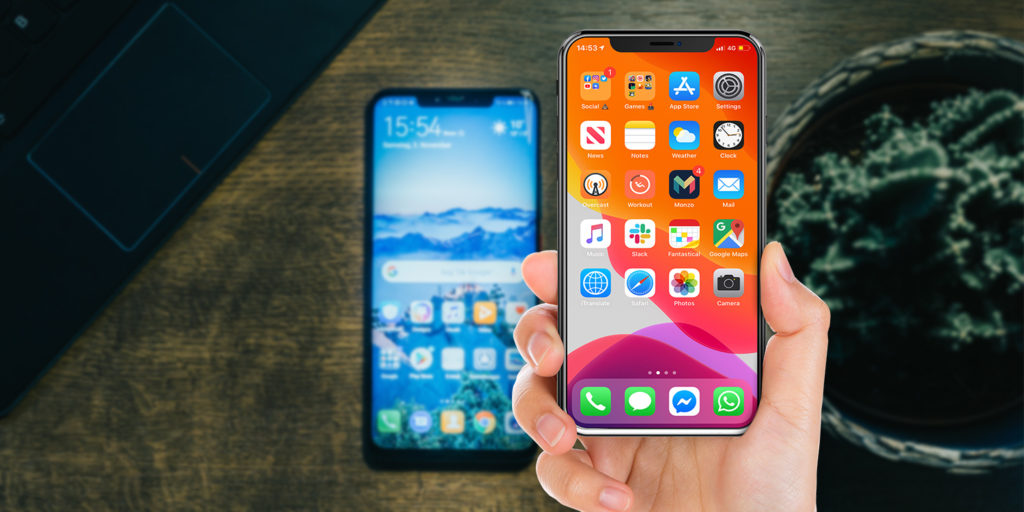The global user base remains enthralled with the ongoing rivalry between Android and iOS in the constantly changing realm of mobile technology. Android applications are software applications created for mobile devices running the Android operating system. Usually created in Kotlin or Java, they are available via the Google Play Store. Software built specifically for Apple mobile devices, such as iPads and iPhones, are iOS applications.
These apps, created in Swift or Objective-C, are only available through the Apple App Store. The applications created for each platform are one of the most critical components of this competition. In this blog post, we will examine key distinctions between Android and iOS applications and the destinations of each ecosystem. In this article, you will learn about the difference between iOS and Android development and Cognitive IT Solutions’ custom app development services.
Google Play Store for Android:
With access to a wide selection of apps, Android users swarm to the Google Play Store. The Play Store is famous for being open and accepting various apps, from games to utility utilities. Google gives developers a lot of flexibility, which lets them play around with multiple features and capabilities.
The iOS App Store:
Conversely, those who use iOS find comfort in the Apple App Store. The App Store, renowned for its strict app approval procedure, offers a range of excellent apps. Apple’s smooth interoperability across platforms, including Macs, iPads, iPhones, and Apple Watches, guarantees a unified user experience.
Key Differences between iOS and Android Development
Fragmentation vs. uniformity:
Due to its open-source nature, Android is prevalent across various devices from various manufacturers. It leads to diverse screen sizes, resolutions, and hardware capabilities, resulting in a fragmented user experience. On the other hand, IOS is exclusive to Apple devices, ensuring a uniform experience across all supported products.
Development Language:
Java and Kotlin languages assist in the creation of Android applications. They allow for a more flexible coding structure and a broader range of development tools. Apple’s strict guidelines make it imperative for developers to adhere to specific coding standards, ensuring consistent and optimized performance.
App Approval Process:
The app approval process differs significantly between the Google Play and Apple App Store. While Google adopts a more lenient approach, allowing apps to be published swiftly, Apple employs a rigorous screening process. The App Store’s stringent guidelines ensure that only polished, secure, high-quality apps make it to the iOS ecosystem.
Consistency vs. customization:
Android customers love the flexibility of customization, which enables them to customize their smartphones extensively. Launchers, widgets, and a variety of themes are easily accessible. Conversely, iOS adheres to a unified design ethos, offering users a slick and consistent experience. IOS less emphasizes customization possibilities in favor of a simple and seamless user interface.
Models of Revenue:
Additionally, the app creators’ revenue models are different. Android apps frequently use the freemium business model, making money through in-app purchases and adverts. On the other hand, Apple customers are more likely to pay for apps upfront, raising the average user income. This disparity affects the approaches developers use in selecting a platform for their apps.
Custom App Develop Services of IOS And Android Apps:
Businesses looking to increase productivity, optimize operations, and boost overall efficiency now depend heavily on business IT solutions for Android and iOS apps. Both platforms provide special features and functionalities to meet various business requirements. Let us examine how Business IT solutions work with iOS and Android apps:
Development of Applications:
Android:
- Android is open-source, and developing apps can be versatile and affordable. Companies can choose from various development tools and programming languages, including Java and Kotlin.
- The plethora of resources and development opportunities facilitates organizations in identifying the appropriate expertise for their particular need.
IOS:
- The Apple App Store has a rigorous approval procedure for apps to ensure high standards for security and quality, which may prolong the deployment time.
- Businesses may deploy, manage, and secure iOS devices with the help of Apple’s Mobile Device Management (MDM) system, which offers powerful features. It allows central management of security setups, upgrades, and app delivery.
Device Support and Fragmentation:
Android:
- Due to the ecosystems many different manufacturers and models, device fragmentation exists. Companies need to ensure that various devices can use their applications.
- Businesses trying to provide a consistent experience may need more consistency across all devices to implement regular OS updates.
IOS:
- All compatible devices receive simultaneous, universal iOS upgrades. It guarantees companies will not worry about fragmentation when utilizing the newest features and security updates.
- The iOS ecosystem’s comparatively small number of device models makes compatibility testing and support more accessible.
Safety:
Android:
- Android’s open nature presents benefits and security issues. Customization is possible, but enterprises must also implement strong security measures.
- Google’s enterprise-focused solution, Android Enterprise, improves security with features like secure boot, encryption, and frequent security upgrades.
IOS:
- The sophisticated security architecture of iOS is famous. The stringent app approval procedure and limited environment help to reduce the possibility of infection.
- Apple’s focus on security and privacy, along with features like Face ID and Touch ID, makes iOS the platform of choice for companies handling sensitive data.
Experience of the User:
Android:
- With its flexible user interface, Android enables companies to create apps that cater to a wide range of customer tastes.
- Due to the many different types of devices, companies must build their apps to work with varying screen sizes and resolutions.
IOS:
- IOS offers a unified and refined user experience across all devices.
- Businesses may ensure a smooth interface by streamlining the development and design process through this standardization.
Frequently Asked Questions (FAQs)
1. What distinguishes Android applications from iOS applications?
Applications for iOS and Android run on distinct operating systems. Whereas iOS apps are compatible with Apple devices running the iOS operating system, Android apps operate on devices utilizing the Google-developed Android OS.
2. Android applications vs iOS applications, which one is better?
Indeed, when it comes to customization, Android is superior to iOS. With widgets, unique launchers, and themes, users may customize their devices.
3. Do iOS and Android users have distinct preferences regarding app pricing models?
Indeed, there is a distinction in user conduct. IOS consumers are more likely to pay for apps upfront, but Android users frequently come across freemium models with in-app purchases and advertisements.
4. How are system upgrades handled on iOS and Android?
Because different manufacturers provide updates at different times, device fragmentation may cause delays in Android updates. Conversely, iOS updates are concurrently and globally accessible for all compatible devices.
5. Which ecosystem integrates third-party services more effectively?
While iOS tightly interacts with Apple’s ecosystem, assuring a consistent device experience, Android easily integrates with various Google services.
Conclusion
Beyond personal preference, the debate over Android vs. iOS apps delves into the fundamental beliefs of these two industry heavyweights. Android is a platform that emphasizes openness, flexibility, and diversity, while iOS emphasizes consistency, rigorous quality control, and a seamless user experience. Whether you are an Android devotee who loves customization or an iOS enthusiast who enjoys a more straightforward experience, both platforms continue to shape the future of mobile technology.




